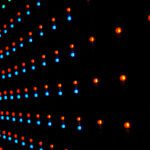Two international postdoctoral researchers have been awarded prestigious Forrest Research Foundation Fellowships to study at Curtin University next year.
Dr Nichole Barry, from the United States of America and currently based at the University of Melbourne, will be conducting research into how the Universe underwent a change creating the very first stars and galaxies 13 billion years ago, known as our Cosmic Dawn. Dr Jacob Martin, from New Zealand but currently based at the University of Cambridge’s Singapore research centre (Cambridge CARES), will be investigating the best ways to capture and store hydrogen – an excellent source of clean energy.
Curtin University Vice-Chancellor Professor John Cordery congratulated the two recipients who will be joining Curtin in 2021.
“By measuring the faint glow from the Cosmic Dawn, Dr Barry will create a movie of the formation of the first galaxies through the last phase change in our Universe’s history, called the Epoch of Reionisation. Her work will look at the hydrogen left over after the Big Bang, which could hold clues to solving some of the most profound mysteries of the Universe,” Professor Cordery said.
“Dr Martin’s research will aim to create the optimal ‘glove’ for storing hydrogen. Currently, hydrogen gas requires large tanks and high pressure for storage but Dr Martin will apply new methods to experimentally ‘flex’ or ‘curve’ activated carbons, which could ultimately make storage easier and cheaper.
“We are pleased to welcome Dr Barry and Dr Martin to Curtin as part of their Forrest Fellowships and look forward to their significant research contributions in the fields of radioastronomy and hydrogen storage.”
The Forrest Research Foundation was established in 2014 following a donation of $65 million by Andrew and Nicola Forrest through the Minderoo Foundation.
Fiona David, Chair of Research at the Minderoo Foundation, said she was delighted that the Foundation was able to support these most recent Fellowships.
“The Forrest Research Foundation aims to attract the brightest minds to conduct research that can address the world’s biggest problems, right here in Western Australia,” Ms David said.
“WA is home to one of the world’s largest scientific endeavours, the multi-billion-dollar Square Kilometre Array which will be the world’s largest radio telescope. Bringing globally ranked talent like Dr Barry to WA, to work on these remarkable facilities, helps put our state at the centre of future research and development.
“WA is also well on track to take a leading role in developing renewable hydrogen as an energy source. Dr Martin’s work in hydrogen storage will be critical in bringing this low-carbon fuel to market, making a major contribution to addressing the global climate crisis, while helping to grow a new industry in Western Australia.”
The Forrest Research Foundation provides support to international and domestic students to enrol in a Doctor of Philosophy (PhD) degree at one of the State’s universities and also supports leading researchers who are at the start of their career by providing post-doctoral fellowships.
Further information on the Forrest Fellowships can be found online here



